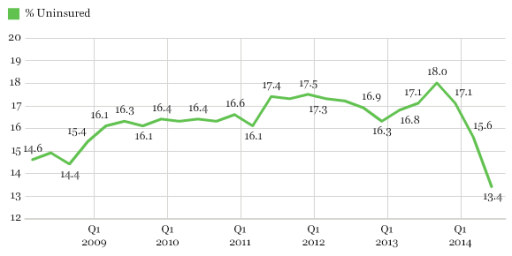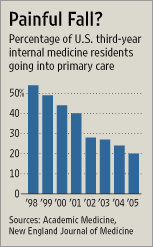Doctors Becoming More Liberal?
America's physicians are becoming more liberal in response to changing working conditions.
Are America’s physicians becoming more liberal in response to changing working conditions? One news article says yes.
NYT (“As Physicians’ Jobs Change, So Do Their Politics“):
Doctors were once overwhelmingly male and usually owned their own practices. They generally favored lower taxes and regularly fought lawyers to restrict patient lawsuits. Ronald Reagan came to national political prominence in part by railing against “socialized medicine” on doctors’ behalf.
But doctors are changing. They are abandoning their own practices and taking salaried jobs in hospitals, particularly in the North, but increasingly in the South as well. Half of all younger doctors are women, and that share is likely to grow.
There are no national surveys that track doctors’ political leanings, but as more doctors move from business owner to shift worker, their historic alliance with the Republican Party is weakening from Maine as well as South Dakota, Arizona and Oregon, according to doctors’ advocates in those and other states.
That change could have a profound effect on the nation’s health care debate. Indeed, after opposing almost every major health overhaul proposal for nearly a century, the American Medical Association supported President Obama’s legislation last year because the new law would provide health insurance to the vast majority of the nation’s uninsured, improve competition and choice in insurance, and promote prevention and wellness, the group said.
Because so many doctors are no longer in business for themselves, many of the issues that were once priorities for doctors’ groups, like insurance reimbursement, have been displaced by public health and safety concerns, including mandatory seat belt use and chemicals in baby products.
Even the issue of liability, while still important to the A.M.A. and many of its state affiliates, is losing some of its unifying power because malpractice insurance is generally provided when doctors join hospital staffs.
This is completely anecdotal but plausible.







1. It’s nice to hear that doctors are starting to pay attention to “public health and safety concerns”. For all the railing against government bureaucrats making health care decisions, apparently they were the only ones who cared about the actual provision of health care all these years. But now I know I can ask my doctor about what sort of spreadsheets manage payrolls well.
2. Note that nobody bats an eyebrow (indeed, it’s intuitive) that prioritizing health outcomes is the “liberal” position and prioritizing business outcomes is the “conservative” position in health care. Remember that when you’re choosing who to listen to with respect to Ryancare, etc.
@Andyman: I’m sure they were always paying attention to those concerns. But the point of lobbying groups is to further one’s professional interests, which are different for a business owner and a salaryman.
I like the assumption that being a wage slave, working for the man, “shift worker” is a Democrat virtue. Can doctors’ unions be far behind. They certainly haven’t wasted anytime advocating for forced interference into people’s lives. For their own good, of course.
But no fear, these learned medical “professionals” (is it really a profession if you are now just a line worker implementing policy?) are moving away from being business owners which apparently aligned them with people who seek to provide a value to others in hopes in a mutually beneficial exchange, employ others who assist in that endeavor and, dare I say, seek to limit strangling government regulations that inhibited their ability to provide quality service.
Do you think the doctors will drag their patients out to the capitol for their union protests like the teachers did? Cause, unionizing teachers has done so much to improve that “profession.”
Workers, as well as business owners, seek to provide a value to others in a mutually beneficial exchange.
While optimally, workers exchange their time, attention and efforts for monetary (and increasingly paid benefits) remuneration in a mutually beneficial exchange, the situation is no where near the same as with a business owner. A worker gets paid for showing up and whether their efforts are as agreed or not, although, this can lead to loss of job. A business owner makes no money regardless of how long or hard they work if they do not provide a service beneficial to their customers. The customers either choose not to buy or take their trade elsewhere.
A worker is exchanging with his employer. Most worker’s pay is not directly tied to the service provided in any single instance, sales commissions excepted. Wage doctors will be paid regardless of the level of service provided to a patient and through collective action can protect themselves from even being held accountable by their employer.
So I would agree, if we removed much of the government mandated interference, say minimum wage laws, with the worker coming to a mutually beneficial arrangement with the employer, workers would be more like business people and thus more likely to seek to improve the cost/benefit of the exchange.
(This, of course, ignores the fact that workers are most often easily exchangeable (controlling neither the means, location or unique tools of the work) often making their efforts a commodity that results in a low price (pay). That many workers cannot compete as independent contractors is another matter entirely.)
I would add that the 1990’s (IMHO) saw a sea change in the lives and businesses of doctors. The HMO’s and insurance companies had massive power by the end of that decade. A doctor was far less of an independent businessman, and more in the position of a tier-two or -three supplier to an industry. In such a position, you live and work by their rules, which they can break with far more success than you can. If they refuse reimbursement, you have to spend money contesting it, with little hope of getting the money, and no hope of getting paid for the money and time spent contesting it. Your daily business becomes shaped by their rules.
Are engineers not professionals because most of them work for companies rather than freelance?
“Can doctors’ unions be far behind?”
JKB, the entire health care system is built around the Doctor’s union.
US Doctor’s have been “unionized” since the 19th century, when degreed physicians organized and got the state governments to prosecuted anyone providing medical care without a “union card”. Midwives were an early victim of this union thuggery.
The “union” maintains it’s position by, among other activities, carefully rationing the number of slots available at medical schools.
It’s a very poorly written article. It fails to address some of the other reasons that doctors might be changing their collective political stripe, it pretends that doctors aren’t aware that medical malpractice premiums and reimbursement rates directly affect their salaries, and dismisses doctorly concerns about medmal on the basis of a single state that already (for whatever reason) has extraordinarily low medmal premiums.
That being said, I don’t think it’s entirely wrong. It comports with what I have seen, anyway. I know at least a couple of doctors who voted Democrat for the first time in 2004 and I’m sure that there were others in 2008. I’ve actually been wondering to myself how much longer doctors were going to be a reliable Republican constituency. But it overlooks significant other factors as to why this might be:
(1) As the government takes on a greater share of medical costs, “small government” can mean no docfix or cuts in Medicare that hurt the bottom line.
(2) There are cultural reasons as well. The party of Sarah Palin is not a party in which doctors are likely to feel comfortable, on a personal level if nothing else. A party with disdain for “elites” is one that has, at best, an uneasy relationship with those that went to college, went to medical school, underwent a lot of training afterwards, and (among other things) tells people what to do for a living. Historically, I believe that one of the things that has pushed doctors to the right is the degree to which they see actions and consequences bearing one another out – that most poor people make poor decisions, contributing to their status as poor people and leaving them broken with a sense of entitlement that it’s up to doctors to put them back together. Recent trends muddy that argument as some folks associated with the right express a disdain or indifference for some of those things (getting an education, behaving responsibly) that lead to a better life.
(3) I don’t know whether it’s shrewd politics or because President Obama really looks at the state of primary care and is concerned, or both… but the favoritism he is showing primary care docs is politically brilliant. He has installed a rural health family practice doc as Surgeon General. His health care plan sort of gives specialists the shaft in order to help primary care physicians. This is politically smart because of all doctors, it’s primary care physicians that are probably the most likely to go Democratic. They’re more likely to be women and less likely to be money-driven.